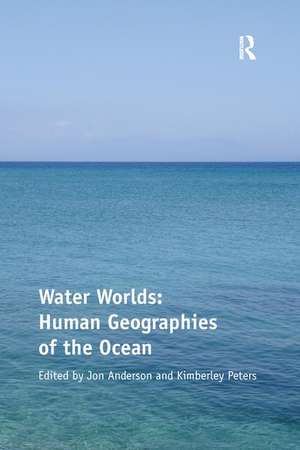Water Worlds: Human Geographies of the Ocean
Autor Kimberley Peters Editat de Jon Andersonen Limba Engleză Paperback – 9 sep 2016
| Toate formatele și edițiile | Preț | Express |
|---|---|---|
| Paperback (1) | 463.58 lei 6-8 săpt. | |
| Taylor & Francis – 9 sep 2016 | 463.58 lei 6-8 săpt. | |
| Hardback (1) | 1055.69 lei 6-8 săpt. | |
| Taylor & Francis – 12 feb 2014 | 1055.69 lei 6-8 săpt. |
Preț: 463.58 lei
Nou
Puncte Express: 695
Preț estimativ în valută:
88.70€ • 92.86$ • 73.40£
88.70€ • 92.86$ • 73.40£
Carte tipărită la comandă
Livrare economică 05-19 aprilie
Preluare comenzi: 021 569.72.76
Specificații
ISBN-13: 9781138248656
ISBN-10: 1138248657
Pagini: 214
Dimensiuni: 156 x 234 x 12 mm
Greutate: 0.32 kg
Ediția:1
Editura: Taylor & Francis
Colecția Routledge
Locul publicării:Oxford, United Kingdom
ISBN-10: 1138248657
Pagini: 214
Dimensiuni: 156 x 234 x 12 mm
Greutate: 0.32 kg
Ediția:1
Editura: Taylor & Francis
Colecția Routledge
Locul publicării:Oxford, United Kingdom
Cuprins
Contents: Foreword: on thalassography; Introduction: ’A perfect and absolute blank’: human geographies of the ocean, Jon Anderson and Kimberley Peters. Part I Ocean Knowledges: Understanding the Water World: Mediterranean metaphors: travel, translation, and oceanic imaginaries in the ’new Mediterraneans’ of the Arctic Ocean, the Gulf of Mexico and the Caribbean, Philip E. Steinberg; ’Plenty of weeds and penguins’: charting ocean knowledge, Anne-Flore Laloë; Geographies of coral reef conservation: global trends and environmental constructions, Bärbel G. Bischof; Merging with the medium? Knowing the place of the surfed wave, Jon Anderson. Part II Ocean Experiences: Embodied Performances, Practices and Emotions: The day we drove on the ocean (and lived to tell the tale about it): of deltas, ice roads, waterscapes and other meshworks, Phillip Vannini and Jonathan Taggart; What I talk about when I talk about kayaking, Jon Anderson; Deep ethnography: witnessing the ghosts of SS Thistlegorm, Stephanie Merchant. Part III Ocean Natures: Mobilities and More-Than-Human Concerns: Sustaining livelihoods: mobility and governance in the Senegalese Atlantic, Juliette Hallaire and Deirdre McKay; Governance of the seas: a more-than-human perspective on the Cardigan Bay scallop fishery, Christopher Bear; ’With perfect regularity throughout’; more-than-human geographies of the Royal Mail Steam Packet Company, Anyaa Anim-Addo; Taking more-than-human geographies to sea: ocean natures and offshore radio piracy, Kimberley Peters. Index.
Notă biografică
Dr Jon Anderson is a Senior Lecturer in Human Geography at the University of Cardiff, UK and Dr Kimberley Peters in a Lecturer in Human Geography at Aberystwyth University, UK.
Recenzii
’This terrific book examines many elements of watery worlds, both historically and in the present. This is a very good example of how a new area of thinking and research can be brought into being through a carefully edited single book. It deserves a wide readership.’ John Urry, Lancaster University, UK ’In this smart collection of essays, human geographers and others are (re)introduced to the watery parts of the globe. If human geographers, and social scientists in general, have been largely neglectful of seas and oceans then this is a brilliant corrective which does some of the necessary catching up. Here the sea becomes a space of both control and rebellion, a material entity as well as a space of representation and practice. It sets an inspiring agenda for further research as it goes some way to filling in the blank space of the sea.’ Tim Cresswell, Northeastern University, Boston, USA
Descriere
Critical human activities take place at sea, including trade, tourism, migration, scientific exploration and resource exploitation. This book offers a novel and important contribution to an ever-emerging cross-disciplinary subject matter and challenges human geography's preoccupation with the terrestrial. Linking to new theoretical debates shaping the geographic discipline, (such as affect, assemblage, emotion, hybridity and the more-than-human) this volume unlocks new knowledge concerning the human geographies of ocean space and dispenses with fixed conceptions of space. It advances geographical understanding based on the world as 'becoming', changing, mobile and processional.
